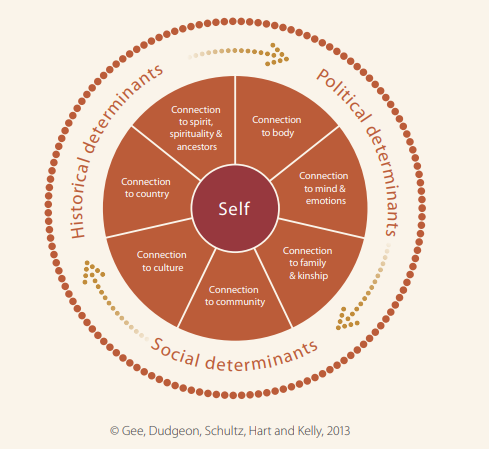Evidence-based policy underpins the development of relevant programs to support the wellbeing of communities. The National Strategic Framework for Aboriginal and Torres Strait Islander Peoples’ Mental Health and Social and Emotional Wellbeing 2017–2023 (the Framework) proposes a model of social and emotional wellbeing with 7 connected domains:
- body
- mind and emotions
- family and kin
- community
- culture
- country
- spirituality and ancestors (Gee et al. 2014).
The diagram below presents research from Dee et al (2014) based on Indigenous approaches and understandings of health and wellbeing. It’s underlying principles recognise historical trauma and structural discrimination that has impacted Indigenous people’s lives:
- Health as holistic
- The right to self-determination
- The need for cultural understanding
- The impact of history in trauma and loss
- Recognition of human rights
- The impact of racism and stigma
- Recognition of the centrality of kinship
- Recognition of cultural diversity
- Recognition of Aboriginal strengths.
This policy and supporting research addresses mental health holistically and through a wellbeing perspective. A holistic approach grounded in cultural wellbeing, understanding and kinship is particularly important in building dementia-friendliness. Dementia is not a mental illness, although people living with dementia can experience mental health issues, such as depression both prior to and following the onset of dementia. According to the Australian Institute for Health and Welfare, this social and emotional wellbeing framework “was developed under the guidance of the Aboriginal and Torres Strait Islander Mental Health and Suicide Prevention Advisory Group. It was endorsed by the Australian Health Ministers’ Advisory Council in February 2017.”

The Federal Government’s 10 year Aboriginal and Torres Strait Islander Health Plan 2021-2031 includes actions targeting healthy ageing. Its framework acknowledges both cultural and social determinants of health:
Culture is a foundation for Aboriginal and Torres Strait Islander health and wellbeing. It is a protective factor across the life course, and has a direct impact on broader social determinants outcomes. Gains across these broader determinants, in turn, reinforce cultural connectedness, maintenance, resurgence, nation building and pride in cultural identity.
In other work I have undertaken, core concepts of place-based, person-centred and integrated service provision are bubbling through policy and program development related to health and wellbeing. Approaches like collective impact are implemented in communities experiencing complex disadvantage. However, to the best of my knowledge, there are no collective impact approaches addressing dementia in Australia, though quick google finds this approach adopted elsewhere.
Reference
Gee G, Dudgeon P, Schultz C, Hart A, and Kelly K, ‘Social and Emotional Wellbeing and Mental Health: An Aboriginal Perspective’. Chapter 4, in Dudgeon P, Milroy M, and Walker R(eds.), Working Together: Aboriginal and Torres Strait Islander Mental Health and Wellbeing Principles and Practice. Revised Edition, Commonwealth of Australia, Canberra, 2014, p.55.
Posted on 06/05/2023
0